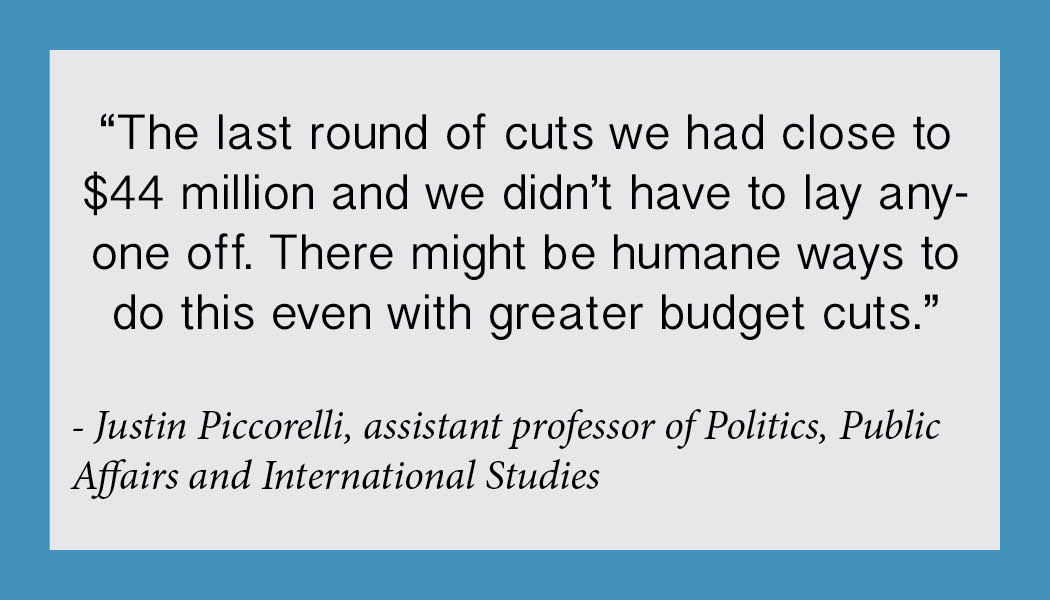A proposed regulation affecting job security for UW faculty in times of budget cuts was approved by faculty senate after much deliberation at a recent meeting, with the initial version by the UW Board of Trustees now revised and sent back for their consideration.
Monday, Feb. 12, the meeting of faculty senate also saw the introduction of a new bill concerning the creation of new programs and their approval by the board.
The finalized bill, Senate Resolution No. 340, establishes the circumstances under which budget constriction policies can be enacted. This includes the elimination of possible tenured faculty positions as a response to budget cuts of more than four percent of the previous annual budget.
“If you look at institutions that do not have robust uniregs in place, you will see that there is a very strong tendency for administrations to get rid of their most expensive people and those are tenured faculty,” Professor of Veterinary Sciences and Faculty Chair-Elect Dr. Donal O’Toole said.
O’Toole expressed his support for the four percent cutoff as a satisfactory but reasonable required amount to trigger the constriction policies.
“Four percent represents what the administration thinks can be handled without filling open positions and using UW reserves,” Faculty Senate Chair Michael Barker said. “If it gets over four percent, then there have to be real cuts in other areas.”
The debate for the bill centered on attempts to pinpoint a reasonable figure to protect faculty positions, considering possible growth or shrinkage of future budgets and whether a fixed amount or a percentage was the best solution. Some faculty felt a cutoff of four percent would set the bar too low and that a higher figure would be a better guarantee for faculty job security.
Previous cuts far exceeded the proposed four percent, as Assistant Professor of Politics, Public Affairs and International Studies Justin Piccorelli pointed out. His proposed solution was to set the cutoff at a fixed figure of $30 million, which would be twice the proposed amount of the current budget.
“The last round of cuts we had close to $44 million and we didn’t have to lay anyone off,” Piccorelli said. “There might be humane ways to do this even with greater budget cuts.”
Other faculty senators expressed confidence in the long-term value of percentages over fixed numbers and in the four percent figure that Faculty Senate’s Executive Committee found acceptable as they prepared the initial Faculty Senate version of the regulation. That amount made it into the final version, which was passed with little dissent.
Senate Resolution #341 was then introduced, which established the procedure for approving new programs. The regulation proposed by the Board of Trustees included a new step in which the board would have the opportunity to approve or deny a new program after reviewing a three-page introductory document.
“In the view of the Executive Committee that slows down the process,” Associate Professor of Law and Member-at-Large of the Executive Committee Kenneth Chestek said. “We understand that the trustees do want to be informed going forward as things develop, but we think there’s a much more efficient way of handling that, satisfying their needs for information but not to slow down the process. The trustees have frequently said things move too slowly around here, but this proposal actually slows down the process of coming up with a new proposal and the Executive Committee fears it can stifle innovation.”
The Executive Committee’s main change would eliminate that step, on the grounds that a three-page paper would be insufficient to present and understand a new program and open an unnecessary window for the denial of valuable new programs. That change would be accompanied by counter-proposals to keep the trustees informed and maintain faculty flexibility to propose and implement new programs.
O’Toole voiced opposition to the early approve-or-deny checkpoint proposed by the board and has urged faculty to maintain their influence over the university’s education of students.
“You are the university,” O’Toole said. “Every time you walk into a classroom, you are the university.”
SR No. 341 has been tabled until the next faculty senate meeting on Feb 27.



